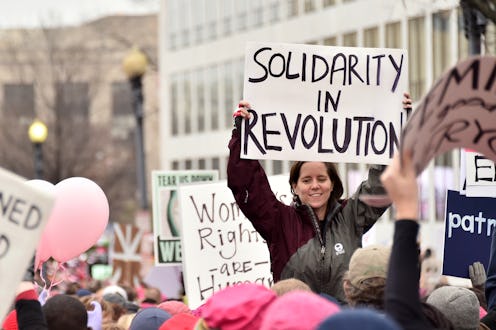News
Assault Allegations Aren’t A Trend, They Are The Truth

2017 has been the year of the silence breakers: the year that women across the country brought down some of the world's most powerful men by having the courage to share their stories of abuse, harassment, and sexual misconduct. While some of the allegations being made are years, or even decades, old, many of them have only recently come to light as a result of the mobilizing power of the #MeToo movement. But it's important to recognize that these assault allegations are not part of a trend; they are a powerful reminder of systemic issues in American society that have held women back from achieving success in the workplace for decades. And that's the truth.
The New York Times first published its bombshell report about sexual harassment and assault allegations against movie mogul Harvey Weinstein in October. Ultimately, not much later, he was ousted from his own multi-million dollar company. He has denied any nonconsensual sexual activity. Since then, the Me Too hashtag has been shared online over a million times as a way for other women to come forward with their own accusations, and it has led to dozens of high-profile men resigning or being fired from their positions of power. TIME Magazine even named "The Silence Breakers" its Person of the Year. And now, activist Tarana Burke, the woman who first inspired the Me Too phrase by starting a nonprofit that helps victims of sexual harassment, is even dropping the New Years Eve ball in Times Square to ring in 2018.
This profound cultural movement has been called a long-awaited reckoning, but unfortunately, some people have also called it a "trend," a term that belittles and demeans the powerful stories that so many women have found the strength to share despite the trauma they've experienced.
Some people have argued that many women have joined the #MeToo movement to jump on the bandwagon and be a part of an online trend that doesn't actually involve them. But what this argument fails to take into account is just how widespread sexual harassment is in American society. Harassment comes in many forms — from a man at the bar not taking "no" for an answer, to a coworker spreading sexual rumors about you, to a supervisor forcing himself on you. And it is exacerbated when women are not represented in male-dominated fields or management positions.
For years, women have had to choose between remaining silent about the abuse they suffered in the workplace or climbing the professional ladder. They worried that they would be labeled "difficult to work with" if they reported misconduct by an executive. They feared being fired if the man in a higher position denied the allegations. And in many instances, these fears were legitimate — especially when very powerful men were the alleged perpetrators.
In the most high-profile example of men seeking to derail the careers of women who spoke out against them, director Peter Jackson claimed in an interview for Stuff in November that Weinstein supposedly blacklisted two stars who accused him of misconduct, Ashley Judd and Mira Sorvino. He reportedly told directors they were a "nightmare" to work with to ensure that they would not be hired for film projects. Weinstein denied the claims in a statement to Entertainment Weekly, stating that, he "did not blacklist Mira Sorvino, and was in fact working with her during the timeframe in question."
"I burst out crying," Sorvino wrote in a tweet after hearing of Jackson's claims. "There it is, confirmation that Harvey Weinstein derailed my career, something I suspected but was unsure."
This kind of silencing is the exact reason why sexual assault is so pervasive: the powerful men who have been guilty of misconduct are allowed to thrive, while the survivors are punished and, in many cases, forced to leave their fields. In an op-ed for NorthJersey.com, Democratic Party strategist Julie Roginsky explained how this horrible cycle has kept so many women from entering the political arena and creating policies that can help end the prevalence of assault.
Countless lectures have been devoted to the dearth of women in politics and government, but the one issue that rarely comes up is the reason why so many women choose not to stay involved. When misogyny is allowed to thrive and politicians turn a blind eye to bad behavior by their colleagues or staff, many women tend to walk away from the field altogether. What is left is public policy that is shaped by men, often for the benefit of men.
Women are not coming forward in 2017 because doing so is "trendy." They are coming forward because finally, after so many years of dismissal, people are listening. Thankfully, a majority of Americans recognize this. According to a Pew Research poll, 66 percent of Americans believe that recent sexual misconduct allegations "reflect widespread problems in society."
Sadly, some people still don't recognize just how much of a watershed moment it is for women to actually feel comfortable sharing their stories of harassment without fear of retribution. And for them I leave this sage piece of advice from actress and #MeToo advocate Minnie Driver: “The time right now is for men just to listen and not have an opinion about it for once.”